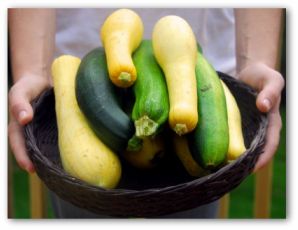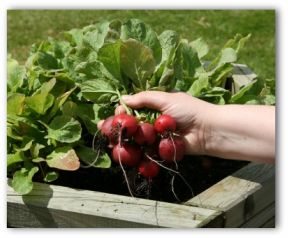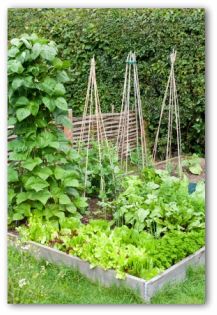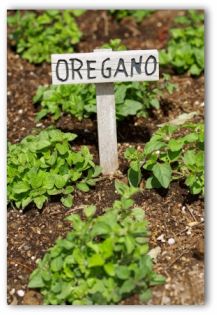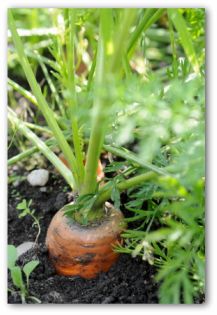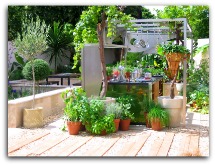| Back to Back Issues Page |
 |
|
Get the Dirt, Issue #007 How to Create a Small Organic Garden May 13, 2011 |
Dear Fellow Gardeners,How to Create a Small Organic GardenPlanning Your GardenIf your appetite for fresh vegetables is bigger than the spaces you have to grow them in, try these ways to coax the most produce from the least amount of space. * Gain room by growing vertical crops that can grow upwards instead of outwards. Trellis snow peas, shell beans, pole beans, and cucumbers. * Mix fast-maturing salad crops such as lettuce, radishes, spinach, and beets together in 2' square blocks. Succession plant every 2 weeks in early spring and fall. (Depending on your location.) * Avoid over-planting any single vegetable. Summer squash is the number one offender when it comes to over-production. (Such a show-off!) One plant each of zucchini, yellow-neck, and a novelty summer squash will yield plenty of squash for both fresh and frozen vegetables for most families and some of the neighbors, too. * Choose medium and small-fruited cultivars of tomatoes and peppers. The smaller the fruits, the more plants tend to produce. Beefsteak tomatoes and big bell peppers produce relatively few fruits per plant. * Experiment with unusual vegetables that are naturally compact such as kohlrabi, bok Choy, and Oriental eggplant. Try your hand at dwarf cultivars of larger vegetables. * Maintain permanent clumps of perpetual plants such as chives, scallions, and perennial herbs. Even a small garden can have a lot to offer! When Size MattersPerhaps the decision to create a small organic garden has less to do with the size of the available site and more to do with your allotted time devoted for vegetable gardening. It is just a quick chore to replace potting soil in a container garden but a weekend of intensive labor to till a quarter acre of clay or rocky soil. Besides the availability of time needed for vegetable gardening there is the required yield. If you have a small family then a small sized plot is ideal for your needs, unless you plant to do a lot of canning or freezing. For example, collards yield 7.0 pounds per square yard and celery 13.2 pounds per square yard. Calculate the expected harvest of the vegetables you have chosen to raise into your plans to create small organic gardens.
When planning the size, be realistic about your family's and neighbor's appetites. It is a welcome sight to see a smiling neighbor walk across the lawn with a gift basket of red ripe tomatoes in early summer but not so pleasant to trip over the bushel of zucchini they left at your doorstep in the middle of the night! Vegetable Succession PlantingAn idea in creating a small organic vegetable garden is to use succession planning. For example, Swiss chard that is planted in the spring is followed by cantaloupe in the summer and replaced with endive in the fall. Vegetable Gardening on a Smaller ScaleThere are many advantages to vegetable gardening on a smaller scale than a traditional sized garden. Back in the days when our grandparents were young, the average size garden site was the 50 X 100 feet, which is about the size of a tennis court. (This was when everyone canned or preserved all of their own food for winter!) Traditional gardens are oblong or square shaped and are perhaps the easiest to plan. However, there is no set rule that says your garden plot cannot be circular or oval! Whatever size of available space you have, which may be only 10 X 10 or even 5 X 3, it is possible to grow a wide variety of vegetables. Do not feel at a loss if you only have a small garden space to work with! In upcoming issues, we will cover organic container gardens, building raised beds, square foot vegetable gardening, and designing row gardens.
Best of Vegetable Gardening E-BookDon't forget to download my new e-Book with lots of tips and basic vegetable gardening information! This handy e-Book also contains all the worksheets, sample garden plans, garden diary, and vegetable planting guide for your convenience. It's priced right at only $9.95! Until next week.... Have a Great Garden! |
| Back to Back Issues Page |

